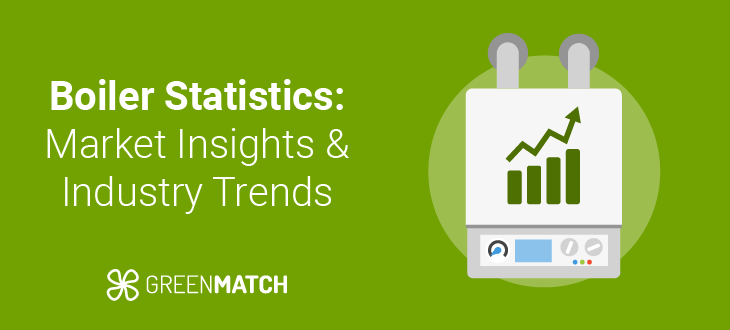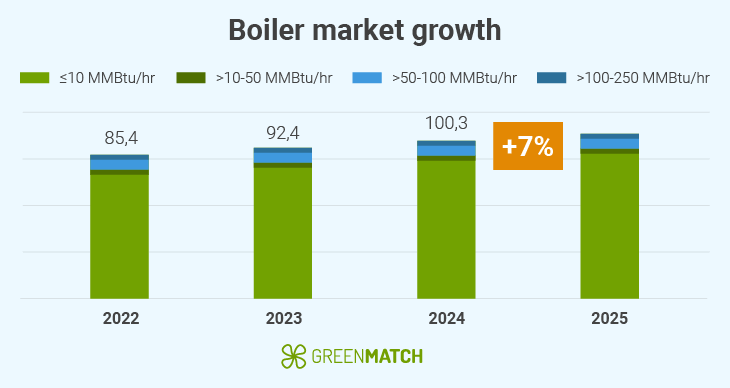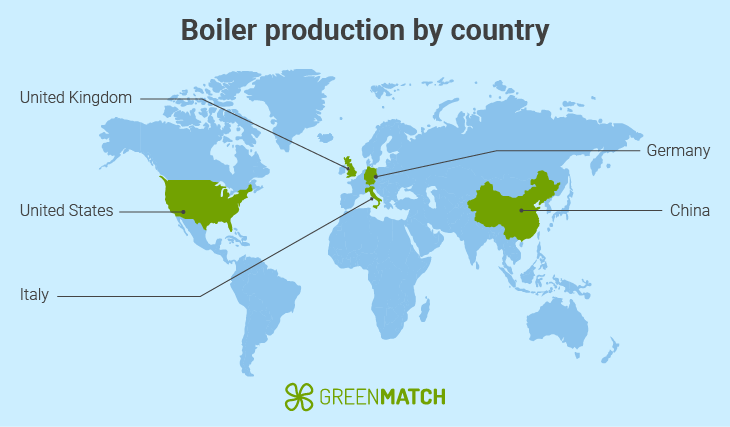Answer these simple questions and we will find you the BEST prices
Which type of solar quotes do you need?
It only takes 30 seconds
100% free with no obligation

Get up to 3 quotes by filling in only 1 quick form

Slash your energy bills by installing an energy efficient boiler

We’ve helped over 500,000 homeowners reduce their carbon footprint
- GreenMatch
- Boilers
- Global Boiler Statistics
Boiler Statistics 2025: Market Insights & Industry Trends


- The global boiler market was valued at £77.6 billion in 2024 and is projected to grow at 7% CAGR through 2034.
- Government incentives and net-zero targets are driving a shift toward low-carbon alternatives like heat pumps and hydrogen-ready boilers.
- 90% of UK homes still rely on boilers. Combi boilers dominate the UK market, making up 80% of domestic boiler sales.
- Traditional gas boilers are under pressure in Europe, with 1.5 million fewer units expected to be sold over the next five years due to stricter regulations.
The boiler industry is rapidly changing year to year, with further advancements in technology, stricter regulations, rising energy costs and a push for greener energy sources among customers. As the demand for energy-efficient, low-emission energy solutions increases, the boiler industry is reshaping its product developments with manufacturers focusing on smarter technologies, alternative fuels and improved performance.
As a result, the global boiler market size was valued at $100.3 billion (£77.6 billion) in 2024 and is expected to expand at a compound annual growth rate (CAGR) of 7% between 2025 and 2034, according to Global Market Insights.
In this article, we will explore the latest boiler market statistics and trends for this year, providing insights into the growth of the market, key players, technological developments and future predictions, and we’ll examine how the industry is positioning itself for a more sustainable and efficient future.
General boiler statistics and facts

- The UK has an estimated 23 million boilers installed across homes and businesses.
- Around 90% of UK homes rely on a boiler system for heating and hot water, highlighting their continued importance in the residential heating landscape.
- 4 million homes in the UK are off the mains gas grid.
- 12.5% of families in the UK are fuel poor, meaning that have to reduce costs by up to £600 before energy costs become affordable.
- Combi boilers remain the most popular system in the UK, with approximately 80% of annual boiler sales attributed to this compact, versatile design.
- In 2022, 1.8 million units of domestic boilers were sold in the UK.
- 1.7 million gas boilers, 45 times the number of heat pumps, are being installed every year.
- The UK accounts for around 20% of all boiler installations in Europe, making it one of the continent’s leading markets.
- 6 out of 10 of the world’s top boiler manufacturers are based in Europe, including major players like Vaillant (Germany), Viessmann (Germany), and Ariston (Italy).
- In 2024, the global boiler market was valued at £77.6 billion and is set to increase by 7% between 2025 and 2034.
- Boiler sales are expected to drop in Europe by 1.5 million units in the next 5 years due to tighter regulations.
- In 2025, all newly installed boilers in the UK must have a minimum ErP efficiency rating of 92%, as per Building Regulations Part L.
- Alternative sources to boilers are set to replace the market in the coming years. An estimated 253 million heat pumps are set to be installed globally by 2030.
- By 2030, the UK aims to have hydrogen-ready boilers available for mass rollout, though current models are still in trial or early-stage production.
Boiler adaption by type
The boiler market is split into different types which are based on fuel and application. Each boiler type caters to different needs and preferences.
According to Gov.uk, 90% of homes in the UK have a boiler system, with changing preferences and requirements, different types of boilers are either decreasing or increasing in sales every year.
Combi boilers
Combi boilers are the most popular type in the UK, with an estimated 80% of units sold every year being combis. Their compact size and ability to deliver instant hot water without an additional tank make them a first choice for many homeowners, especially in homes with limited space.
With combi boilers, there are several different types of fuels you can choose from, including gas, oil, liquified petroleum gas (LPG) and electric. As a result of their versatility and compact size, combi boilers remain the dominant choice in the market.
System boilers
System boilers use a separate tank for hot water, which is ideal for homes with a large water output demand, such as homes with multiple bathrooms. Although their unit market share in the UK sits at around 20%, they continue to remain relevant and stable, especially in larger households.
While less commonly installed in new builds, their performance and ability to handle high hot water demand help them maintain a stable position within the market.
Conventional boilers
Conventional boilers, also known as heat-only or regular boilers, are less popular in the UK as they require much more space than systems or combi-boilers.
They rely on the use of both hot and cold water tanks, making them less suitable for modern needs. However, they are still relevant, and while installations are on the decline, especially for new builds, they still account for a small percentage of the market value here in the UK.
Boiler alternatives
A growing demand for greener boiler systems has been emerging over the past few years, which is driven by individuals and governments attempting to reach net-zero emissions by 2050.
Although 57.7% of boilers in Europe still rely on natural gas, there is a gradual shift to alternative boiler fuels such as biomass. This change is supported by government incentives and policies aimed at promoting low-carbon heating solutions.
| Boiler alternatives | |
|---|---|
| Alternative Heating System | Description |
| Air Source Heat Pumps (ASHPs) | Extract heat from outside air to warm your home and water. |
| Ground Source Heat Pumps (GSHPs) | Use underground heat via buried pipes to provide heating. |
| Biomass Heating Systems | Burn wood pellets, chips, or logs to generate heat and hot water. |
| Solar Thermal Systems | Harness solar energy to heat water for domestic use or space heating. |
| Infrared Heating Panels | Radiate heat directly to objects and people, rather than warming the air. |
In the UK, the Boiler Upgrade Scheme offers grants of up to £7,500 to help homeowners cover the cost of alternative heating systems such as biomass boilers, air source heat pumps, and ground source heat pumps. While these incentives are encouraging more people to adopt greener boiler systems, these systems are still relatively expensive. For example, the cost of a biomass boiler can range between £9,000 - £20,000.
As a result of remaining high costs and developing technologies, alternative systems only hold a small percentage of the market share. England, Wales, and Scotland boilers still heavily rely on gas due to the ease of connecting these boilers to the grid, while in Northern Ireland, two-thirds of boilers are oil, according to the Energy Saving Trust.
Reasons for the growth in the boiler market

The value of the boiler market is set to increase in the coming years with an annual growth rate of 7% between 2025 and 2034, according to Global Market Insights. However, a growing demand for low-carbon heating systems will see a slight decline in units being sold per year, especially throughout Europe.
According to Designing Buildings, boilers are set to lose an estimated 1.5 million units in Europe over the next five years. This is mainly due to the increase in legislation, increased efficiency, and sustainability requirements.
While the industry faces clear challenges, the overall market continues to grow. Below are the key reasons behind this continued growth:
- Government incentives: Schemes like the Boiler Upgrade Scheme in the UK offer grants for low-carbon heating systems, which will increase the market value of systems, such as biomass boilers.
- Net-zero targets 2050: National governments are pushing homeowners to replace older boiler systems with greener and more efficient boilers, which will drive up their installation and market value.
- New housing developments: The demand for reliable heating in new residential developments continues to support boiler market growth, especially in urban areas where combi boilers remain a practical solution due to space constraints.
- Fuel cost: Increased costs of fuels such as oil and gas will push more homeowners to replace their older boiler systems with more energy-efficient boilers.
- Innovation: Manufacturers are responding to eco-demands with alternative systems, such as biomass boilers, offering consumers more choice in boilers.
Boiler production by country

Boiler production is a global industry. However, there are several countries throughout the world that are leading in boiler production.
As it stands, European countries still dominate boiler production, with 6 out of 10 of the world’s major boiler manufacturers based in Europe, according to Global Data. However, countries in Asia are quickly catching up with the production, manufacturing and usage of domestic boilers. Here are the top countries.
- Germany is a leader in boiler production, with major brands such as Vaillant, Viessmann, and Bosch dominating both domestic and export markets and are key players in the boiler industry, according to PR Newswire.
- The UK hosts a number of leading boiler manufacturers, including Ideal, Baxi, and Worcester Bosch. The demand for domestic boilers within the UK has positioned the country as one of the world's leading countries in boiler production.
- China leads in large-scale boiler production, driven by substantial domestic demand and expanding export capacities. The country's rapid industrialisation and manufacturing growth have positioned it as a dominant force in the global boiler market, according to Straits Research.
- Italy is a significant player in boiler production, with companies like Ariston and Ferroli exporting products globally. According to IndexBox, the boiler market in Italy grew by 27% in 2024, reflecting the country’s robust production capacity.
- The United States primarily caters to commercial and industrial applications, with manufacturers such as Weil-McLain and Burnham serving the North American market. The U.S industrial boiler market was estimated to be valued at $1.6 billion in 2024, reflecting steady growth driven by ongoing industrialization and investments in manufacturing facilities.
Boiler regulation and sustainability
With an increase in demand for more sustainable heating systems, along with better regulations, the boiler industry is changing rapidly to reflect current demands and regulation requirements. Governments globally are introducing stricter policies aimed at reducing carbon emissions and encouraging the transition to low-carbon heating systems.
In Europe, many countries are attempting to reach net-zero emissions by 2050. This has played a major role in influencing the heating industry. As a result of people and governments becoming more eco-conscious, traditional gas and oil boilers are being scrutinised.
Originally, in the UK, there were plans to ban the sale of gas boilers by 2035 in hopes of encouraging more people to purchase heat pumps to help reach the 2050 target. Unfortunately, this plan has been scrapped, according to the Guardian. While this is a loss for sustainability, it has a positive impact on the boiler industry within the UK.
Net-zero emissions 2050 is a global target to balance the amount of greenhouse gases emitted with the amount removed from the atmosphere by the year 2050.
In the EU, the Energy Performance of Buildings Directive (EPBD) is pushing to phase out fossil fuel boilers from 2025 by encouraging alternative greener energy sources such as heat pumps, solar thermal systems and biomass boilers. This will have a massive impact on the traditional boiler industry, particularly in EU countries.
Heating market outlook as of 2025

The global heating market as of 2024 was valued at 24.9 billion USD and set to expand at a CAGR of 5.7% from 2025 to 2034, according to GMI. This growth is expected to be a result of the focus on energy efficiency and sustainability.
More focus and investment are being made in the advancement of technologies in the heating market, such as heating pumps, biomass systems, and hydrogen-ready boilers, which are gaining ground, particularly in Europe and parts of Asia, where emissions targets are accelerating the adoption of greener alternatives. Currently, the heat pump industry accounts for a 5% revenue share in 2024 and is set to continue.
On top of technological advancements, government incentives and policies are driving the heating market up as of 2025. Initiatives like the Boiler Upgrade Scheme in the UK and similar grants across the EU are helping homeowners and developers invest in eco-friendly heating. In the U.S., the Department of Energy has confirmed that they have allocated 1.2 billion USD to support decarbonisation in the chemicals and refining industries.
Despite this progress, the market will face some challenges, such as high upfront costs and limited consumer awareness. For example, the UK are drastically behind in adopting heat pumps and is still opting for boiler systems. According to Greenpeace, in the UK, 1.7 million gas boilers, 45 times the number of heat pumps, are installed every year.
Looking ahead, the heating market is set to grow, but the real impact on this market will be the shift away from fossil fuels. As technology matures and costs fall, the sector is poised to become a cornerstone of the wider net-zero transition.
Boiler industry trends in 2025
The boiler industry is rapidly changing to align with the current standards and preferences of national governments and their consumers.
As people are moving towards more sustainable heating systems to help reduce their carbon footprint, manufacturers are developing innovative technologies, improving efficiency, and prioritising sustainability across product lines. Below are the key trends shaping the boiler industry this year:
| Trends | Description |
|---|---|
| Hydrogen-ready boilers | Run off 100% hydrogen and produce zero CO2 emissions, they remain in the prototype stage, with manufacturers continuing to develop the technology. |
| Hybrid systems | Combine traditional boilers with technologies like heat pumps or solar thermal systems, improving efficiency and offering greater flexibility. |
| Heat pumps & biomass boilers | Although not boilers in a traditional sense, these are increasingly used as sustainable replacements, supported by incentives like the UK’s Boiler Upgrade Scheme |
| Smart controls & integration | Integration with smart thermostats, zoning systems, and energy management platforms helps optimise heating and reduce energy consumption. |
Future outlook on the boiler market
The boiler industry is on the cusp of a significant transformation, driven by environmental regulations, a demand of energy-efficient units and the need to decarbonise central heating. With traditional gas and oil boilers becoming less relevant, especially in Europe, the boiler market will have to focus on innovation, adaptability, and sustainability.
It is expected that soon more people and businesses will adopt condensing and low-NOx boilers in a response to stricter efficiency requirements. Here in the UK, the domestic and commercial boiler market is expected to steadily grow, which is supported by consumers awareness and environmental regulations, prompting the market to create more energy-efficient units.
Events such as the AF&PA Recovery Boiler Conference will act as hubs for innovation and collaboration, showcasing more compact and modular designs, advanced heater exchange technologies and smarter digital monitoring systems.
Despite the decline of traditional fossil-fuel systems, the boiler market is reinventing itself. Continued research and development into sustainable technologies such as biomass, hydrogen and next-gen electric boilers offers a pathway to growth, provided these innovations are scaled efficiently and cost-effectively.
The future of the boiler market will focus on balancing between traditional infrastructure and emerging demands. With global heating needs still high, the sector is under increasing pressure to decarbonise, innovate, and deliver reliable, low-emission solutions that meet the evolving needs of consumers and climate targets alike.
FAQ
No gas boilers will not be banned in 2025. The UK has scrapped its plan to ban the sale of gas boilers by 2035.
Alternatives include air and ground source heat pumps, biomass boilers, hybrid systems, and hydrogen-ready boilers, many of which are supported by government grants
Key trends include hydrogen-ready boilers, smart controls, hybrid systems, and a growing shift toward sustainable, low-carbon heating solutions
The global boiler market is projected to grow at a 7% annual rate through 2034, driven by innovation, infrastructure needs, and rising demand for energy-efficient systems

Caoimhe is an experienced content writer and researcher who is passionate about providing accessible information to every reader. With a background in English literature and Sociology, she combines the two disciplines to create cohesive, well-thought-out, and well-informed pieces.
We strive to connect our customers with the right product and supplier. Would you like to be part of GreenMatch?

- Boiler Statistics 2025: Market Insights & Industry Trends
- General boiler statistics and facts
- Boiler adaption by type
- Reasons for the growth in the boiler market
- Boiler production by country
- Boiler regulation and sustainability
- Heating market outlook as of 2025
- Boiler industry trends in 2025
- Future outlook on the boiler market
- FAQ
